The joint struggle of the British and Nazis against the Greek Red partisans (1941 - 1945)
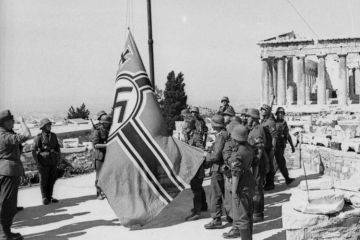
Before you start looking at the topic of Greek resistance, you should go back to 1920-1930's and recall the events and characters that preceded 1941.
Let's start with the Greek King George II. He was born in a royal villa in Tatoi, near Athens, on July 20 1890, and was the eldest son of Constantine I and his wife Sophia of Prussia. After the overthrow of Constantine I during World War I, Crown Prince George followed his father into exile in 1917, and his brother Alexander was installed as puppet ruler by Prime Minister Eleftherios Venizelos. However, in 1920, Alexander died, and the plebiscite restored to the throne Constantine. 27 September 1922, after the defeat of Greece in the Battle of Smyrna during the Second Greek-Turkish War, King Constantine was deposed and George ascended the throne.
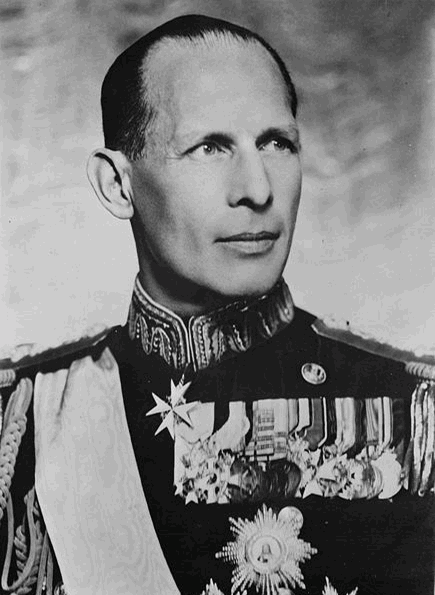
In December, the Republicans won the 1923 election in Greece. At the request of the Republicans, the monarchy in Greece was abolished, and George II went to Romania. 25 March 1924 was finally declared a republic (Second Greek Republic), George was officially deposed and deprived of his citizenship, and his property was confiscated. In 1932, he moved to the UK.
However, in the same year, monarchists came to power in the country, and 10 in March 1935 was ruled by General Georgios Condilis, who proclaimed himself regent. As a result of a rigged plebiscite, the monarchy was restored in Greece - King George II returns.
After George returned, General Ioannis Metaxas, who established a dictatorial, semi-fascist regime in August 1936, became the de facto ruler of the country. During his time, the pressure on the opposition sharply increased, since the Communists received a large percentage of votes in the elections. The popularity of the left among the people could not but bother the king and his entourage, and therefore such measures were taken and tough rule was introduced.
On the initiative of the Communist Party of Greece, the Popular Front was created as part of the Communist Party of Greece, left-wing trade unions, separate socialist groups, and the Agrarian Party in 1934. After the shooting of the 9 strikers in Thessaloniki on May 1936, the appeal of the CC of the CPG and the Popular Front parliamentary faction was published, which condemned the criminal actions of the government and appealed to the people and the army to fight. However, 4 August 1936, General Ioannis Metaxas carried out a fascist coup and established a dictatorship regime, dissolved all political parties, arrested their leaders. During the first 3 months after Metaxas came to power, the deserted islands over 1000 anti-fascists were exiled to the islands.
Metaxas pursued a populist policy (entering the 8 hourly working day, increasing purchase prices for agricultural products, etc.), however, despite this, sympathy for the left among the population continued to grow, although without active opposition to Metaxas.
In foreign policy, General Metaxas, on the one hand, sympathized with Germany and Italy (his regime, up to attributes, was largely copied from Italian fascism), and on the other, he understood that Germany and Italy were natural opponents of Greece. For this reason, Metaxas pursued a fairly pro-British policy.
Fascist aggression against Greece 1940 - 1941
At the start of the 2 World War I, the Greek government declared its neutrality.
In April, 1939, Italy sent its troops into Albania. There is a real threat of the invasion of the Italians in Greece.
The war was preceded by the sinking of 15 August 1940 by the “unknown” submarine of the cruiser “Elli”, during the Orthodox celebration of the Day of the Virgin, on the roadstead of Tinos, and other provocations of fascist Italy, after which Greece carried out partial mobilization.
28 October 1940, the Italian Ambassador in Athens, presented the Prime Minister Ioannis Metaxas an ultimatum demanding the free admission of his troops to Greek territories and cede a number of important strategic points and naval bases. The Greek government rejected the ultimatum. On the same day, the Italian invasion of Greek territory began.

After bribing several pro-fascist generals of the Greek army, Mussolini believed that the Greeks would not offer serious resistance, and the invasion of Greece would be just a cakewalk. Italian fascism did not take into account the determination of the Greek people to defend their country against foreign invaders. Anti-fascist demonstrations swept across Greece. Mobilization, supported by the masses, was carried out quickly.
With the outbreak of hostilities, the Italians managed to advance and achieve some success, but soon the Greeks launched a counterstrike and threw the enemy back to Albania.
Not only did the Greeks throw the Italian duce with his army from their territory, but they still managed to break through the defenses of the fascist troops and fight off part of the occupied territory of Albania. It should be noted that the Greeks won the first major victory among the countries of the anti-Hitler coalition.
Italian soldiers were told that they were going to occupy Greece, and not to fight. Therefore, they did not expect decisive and active resistance from the Greek army. The Italian command discovered that the Greek army had, albeit in small quantities, quite modern weapons. It was a surprise to him.
Duce Mussolini wanted to get rid of Greece on his own, because considered these territories part of his future Roman Empire. But, having received a hat from the Greeks, he was forced to agree to the help of Hitler, although the aggression against Greece was undertaken without agreement with Germany. Taking advantage of the failures of his ally, Hitler willingly expressed a desire to assist his troops in order to bind Italian fascism more firmly to his chariot.
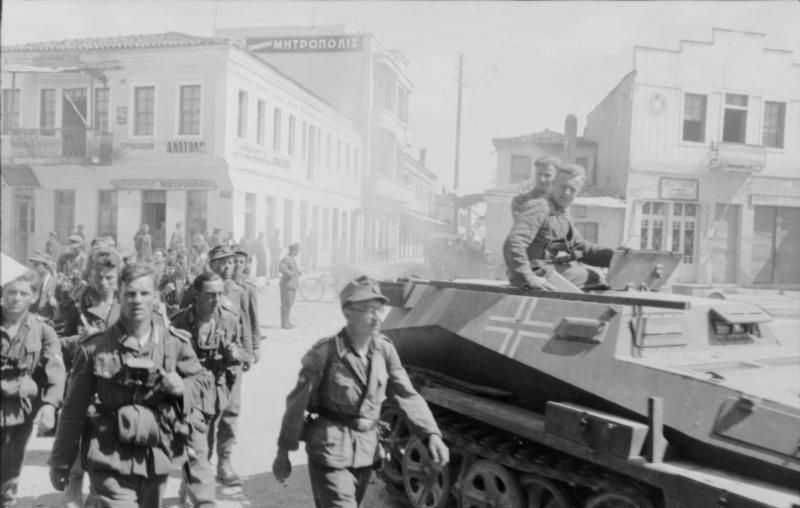
Metaxas 29 January 1941, died of pharyngeal phlegmon. His successor was Alexandros Korizis.
In January, the British government ordered Wavewell to leave 1941 in Cyrenaica for a minimum number of troops and prepare most of the British troops stationed in Egypt to be sent to Greece. March 7 began the transfer of British troops from Egypt to the Greek ports of Piraeus and Volos.
In his post-war memoirs, Churchill insists that the British expedition to Greece was undertaken at the request of Greece, which demanded the implementation of the guarantees given by Chamberlain 13 on April 1939. However, Liddel Garth, for example, had other data. 22 February 1941 arrived in Athens by Eden, accompanied by an impressive staff of military advisers and "forced the new Greek Prime Minister to accept the offer." This happened as follows.
During the talks with Eden and the chief of the English General Staff, John Dill, "Greek leaders were very doubtful whether the British government should accept the intervention, but Eden managed to persuade them to agree, because he exaggerated the amount of aid that England could provide."
The military aid offered by Eden was so impressive that the Greeks were tempted. They began to feel that their safety was assured. However, the Greeks were deceived, and it was made extremely simple. Digital material was prepared to characterize the size of English aid to Greece, says General de Gingand, a former adviser to the British delegation. These figures did not seem good enough to one of Eden's assistants, who compiled a summary. He asked to increase these figures so much that they seemed doubtful to me. ” These questionable numbers were shown to the Greek government.
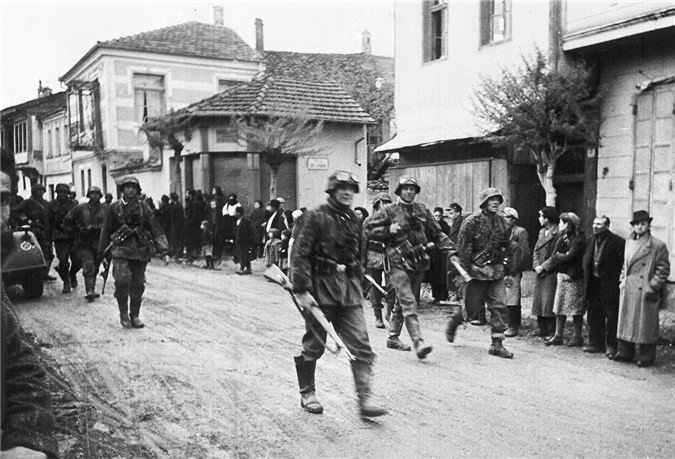
In fact, English help was very modest. The total number of all British troops deployed in Greece was 62 thousand people. These forces were "clearly not enough to show serious resistance to the aggressor." The British expeditionary forces were 150 tanks, which, in the words of the American journalist Gervasi, were not worth a penny, and 8 thousand cars. Aviation support was extremely weak. In total, the English command in Greece had at its disposal 80 operational vehicles.
British troops were sent under the flag of helping the Greek people in the fight against Italian fascism. In fact, British troops were sent to Greece in order to secure British positions in the Balkans.
6 April 1941, Hitler Germany attacked Greece from Macedonia.
While the Greek troops gave the aggressor a heroic rebuff, the British troops froze in inactivity at the lower course of the Aliakmon River.
April 9 commander of the British troops Wilson ordered the beginning of the retreat.
German troops entered combat contact with the British troops 14 April. On the same day, German dive bombers under the cover of fighters subjected to fierce bombardment of the position of British troops.
The headquarters of the 18 of the German army corps informed the commander of the 12 army: April 14 - “The British apparently fled, leaving behind previously prepared defensive positions ...”
The evacuation of British troops on 11 transports under cover of 6 cruisers and 19 destroyers lasted five nights.
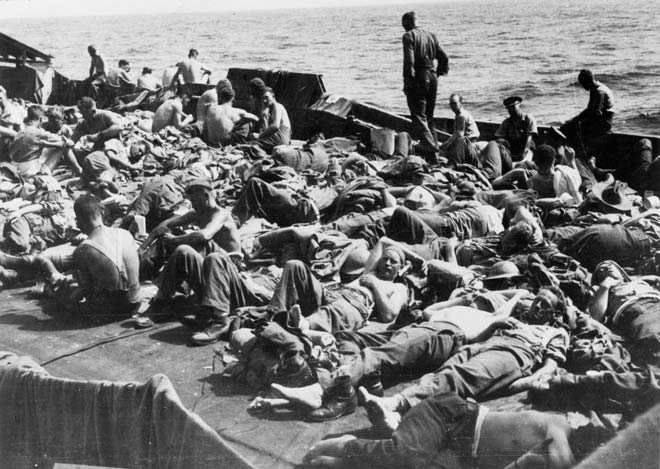
Of the 62 thousand, 12 thousand were lost, and two English destroyers were also killed. British troops lost all guns, vehicles and heavy weapons, including 150 tanks. The evacuation of the British covered the Greek troops.
23 April 1941 in Thessaloniki, General Tsolakoglu signed an act of surrender and truce with Germany and Italy. King George II with his government, following the English patronizing him, left the country, not forgetting to grab all of its gold reserves and hand over to the invaders more than 2000 Greek communists who were in prisons.
By 1 June 1941, the remnants of the British were knocked out of the island of Crete, and he too was in the hands of Hitler.
The English expedition to Greece cost dearly. According to the most minimal calculations, in Greece the British lost a total of 30 thousand people. British troops "had to survive the second Dunkirk, as a result of which they were forced to abandon all the tanks and most of the equipment"
The occupation of Greece by the Axis and the British wrecking
After the surrender, the bourgeois circles of Greece split into three factions. One of them, along with Georg fled to Egypt. The second, with capitulatory generals, formed under the auspices of the Nazis and with the blessing of the British, the quisling government of Georgios Zolakoglu. The third, represented mainly by liberals, took a wait-and-see attitude.
The only force that defended the interests of the nation at this critical moment was the Greek communists - only they were able (thanks to cohesion and discipline) to resist the invaders. Of course, the bourgeois parties kept away from him.
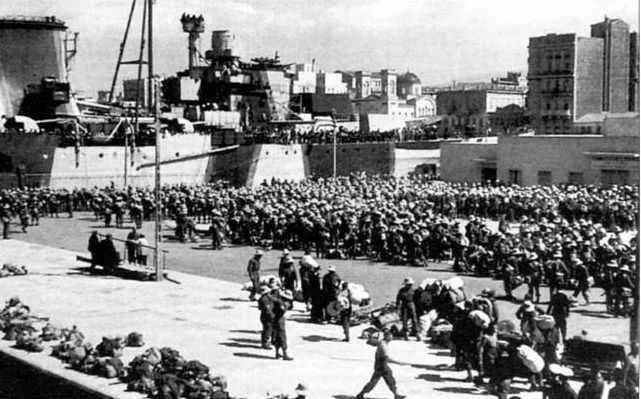
27 September The 1941 Communist, and with it the agrarian, socialist party and the Union of People’s Democracy party founded EAM, the National Liberation Front of Greece. He was the platform on which the struggle of the Greeks against the occupation regime was built. Three months later, on the basis of EAM, the National Liberation Army of Greece, ELAS, was created. The general line of the EAM-ELAS was the unification of all national forces to combat the common enemy. Already at the beginning of 1942, the first organized ELAS units led by Aris Veluhpotis began to operate. The Elasovs caused significant damage to the invaders and quislings.
The successful actions of the united resistance of the left alarmed the Greek government in exile and their masters of the British. They saw in ELAS a force capable of uniting the whole nation around them, which, after the expulsion of the invaders, could have led Greece out of the control of the Anglo-Saxons.
In 1942, the British in the territory of Greece are beginning to conduct subversive activities aimed ... no, not against the Nazis, but against the ELAS !!! It turns out that for the Anglo-Saxons, it was preferable to have Hitler on the land of Greece than ELAS. In September, Colonel Ioannis Tsigande was sent to Athens, in which there was a considerable amount of money intended to finance measures to undermine EAM. Following the colonel in October, an English military mission appeared in Greece, parachuted into the area of the Gion massif, controlled by ELAS troops.
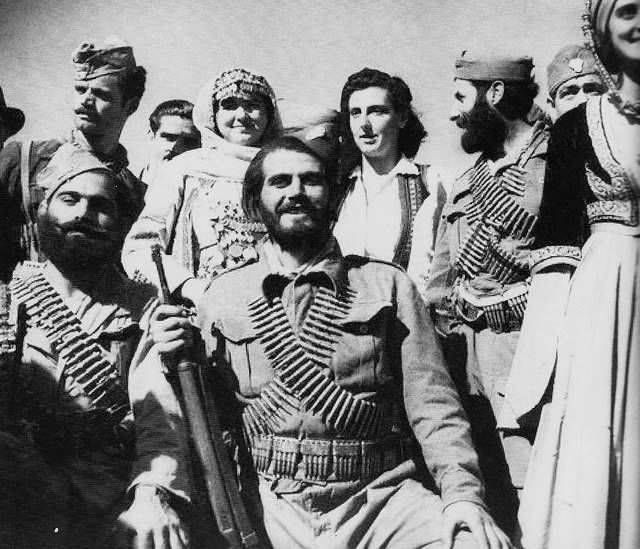
With the support of the British, the Greek bourgeoisie, not daring to fight the invaders, created, however, its own military organization, the EDES. The main purpose of the EDES, as it is not difficult to guess, is the opposition of the Elasians.
However, despite the machinations and wrecking of the British and traitors, ELAS grew and developed. In 1943, the Greek partisans received news of the defeat of the Nazis at Stalingrad. This provoked widespread offensive actions and led to the liberation of half of the territory from the occupiers. During this period, the Germans were forced to create a "Service 1С" to fight the partisans. Simultaneously with the creation of the German 1C, the subversive activities supervised by the British were intensified. London, after defeating the Germans, wished to return the monarchist fascist government to Greece, and, accordingly, the Reds prevented it. EAM-ELAS according to the British plan to be destroyed. Specific directives consistent with this policy were carried out by the British Military Mission (ICA).
The All-Russian Arsenal Association, on the one hand, sought to bring the EAM-ELAS under its control and for this purpose 5 in July 1943 officially recognized the ELAS as “part of the allied army”, and on the other hand, supported the EDES (which opposed the ELAS). Additionally, ECKA and PJSC organizations similar to EDES were created. The pro-British agents, who were stationed in the ELAS units as liaison officers, carried on intensified subversive activities.
The capitulation of Italy in the autumn of 1943 and the transfer of Italian weapons into the hands of ELAS further strengthened its position in the country. A significant part of the population (ca. 2 million people) joined the EAM coalition. The ELAS consisted of 40 000 fighters, while the EDES units were only 3000, and the EKKA was a total of 200 people. This balance of power did not suit, of course, neither the ICA, nor the Greek bourgeoisie.
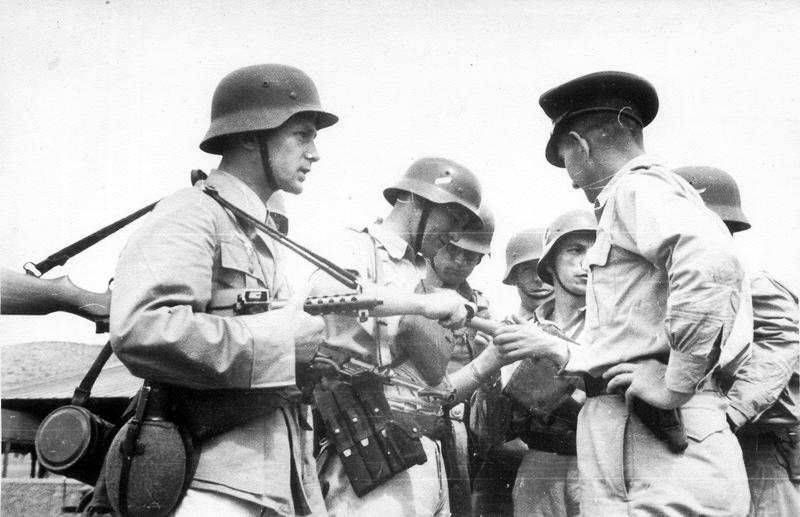
The destruction of the ELAS was the point of contact of the interests of the British, the monarchist fascists and the Quislings with their masters by the Germans. Common interests created the ground for collusion between them to unite efforts to eliminate the "red threat". What is most interesting, the initiative came from the British! In April, 1943, the BCA agents established contact with the Quisling government of I. Rallis, after which the Quislings acted as an intermediary in negotiations with the Nazis. The result of the negotiations was an attack by the combined forces of the occupiers, quislings and EDES troops on the ELAS in October 1943. The victory was on the side of ELAS.
Soon the Tehran agreements were adopted, which thwarted London’s plans for the landing of British troops in the Balkans. All this forced Britain to stop open speeches against the People's Army. A truce was concluded between the ELAS and the EDES, which allowed the VSA to save the remnants of the EDES, which almost died under the fire of Elas.
Rise of the Greek Armed Forces in the Middle East
After unsuccessful attempts to reach an agreement with the government in exile and the bourgeois parties to create a government of national unity to fight the occupiers, EAM 10 in March 1944 established PEEA - Political Committee of National Liberation. This caused a huge resonance, the Greek military units in the Middle East supported PEEA and demanded the exile government to recognize PEEA.
The British and their Greek lackeys declared the anti-fascist forces rebel. It was organized a massacre. All Greek armed forces in the Middle East were disbanded, and the "rioters" were placed in concentration camps created by the British in Africa.
The defeat of the Greek army in the Middle East and the replacement of it with the Praetorian forces, in which anti-communist elements were recruited, ended with the creation of a new émigré government headed by the liberal G. Panandreu. It was only after this that the negotiations with PEEA on the creation of a government of national unity began. 20 May 1944 was signed the so-called Lebanese agreement between the emigrant government, EAM-ELAS, EDES, EKKA and representatives of several bourgeois parties. For the sake of peace and order in Greece, the ELAS, which went through the whole war in the struggle against the invaders, agreed to an unprofitable deal. Judge for yourself, having on your side 50 thousandth experienced army, which controlled 65% of the territory, EAM agreed to 25% of secondary ministerial portfolios and the landing of British troops in the country at the time of its release, which opened the door for the country to react.
One of the detrimental consequences of this agreement was another agreement - Casertsky (September 26 1944), according to which the English commander of all Greek armed forces, including ELAS, was appointed by the English general R. Skobi.
In October, 1944, in connection with the victories in the Balkans of the Red Army, Hitler ordered the evacuation of German troops from Greece.
English occupation of Greece
While the Russian soldiers sacrificed their lives, freeing Yugoslavia, our British allies began to land assault forces ... in Greece. The first airborne landings of the British army were landed here on October 4 1944. The main task of the British was not at all the defeat of the German grouping in Greece, but the speediest advance towards Marshal Tolbukhin’s troops. Not encountering resistance from the German troops, they hurried to occupy the vacated territory in order not to let the Russians into Greece. The Germans left, the British came.
October 12 The German fascist invaders were withdrawn from the capital of Greece, and at the same time the Nazi flag was lowered from the Sacred Rock of the Acropolis (Iero Vraho).
In those days, the Greek People’s Liberation Army (ELAS) gave the last major battle, preventing the invaders from blowing up the power station in Kerazini.
4 November 1944 g. The last German soldiers left the territory of mainland Greece.
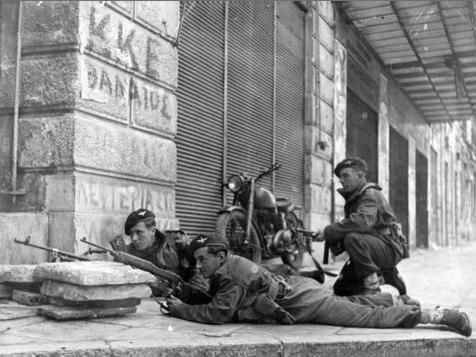
By that time, ELAS controlled the territory of 31,5 from the 33 regions of Greece, and the EDES controlled only 1,5. However, four days after the liberation of Athens, the ELAS troops appeared and the British. By that time, the Germans had no need to fight, because they were hastily evacuated. After arriving in Athens, General Scobi, violating the Lebanese agreement on the dissolution of all armed forces and the creation of a nationwide Greek army, he only demanded that ELAS immediately lay down weapon. Representatives of the Communists in the government refused to sign the decree on the dissolution of ELAS and December 1 out of its composition. Thus the government of Papandreu ceased to exist. The next day, in the cities of Athens and Piraeus, an 500-thousandth demonstration was held against the actions of the government and the English command.
The police forces were thrown against the demonstrators, and then on December 5, on the orders of Churchill, British forces entered the battle against the ELAS. For more than a month, the struggle of the Greek patriots with the English army continued. While the Russians were persecuting and smashing the Germans in the Balkan countries, the British allies, instead of helping, chased the Greek communists through the streets, destroying them in the name of their imperial interests.
But it was not so easy to break the strength of the Greek patriots of the British invaders. By mid-December, the position of the British troops in Athens became critical. It even went so far that General Scobi was about to flee from Athens - the Greek partisans frightened him so much. The plight of the British in Athens, as well as the outrage of the world community by the bloody intervention in Greece, forced Churchill and his foreign minister, Eden, to resort to diplomatic intrigue. On the one hand, they tried to stabilize the situation, and on the other - still achieve their goals.
In order to persuade the masses to surrender under any pretext, they fly to Athens.
On December 26 a conference was convened of representatives of ELAS and the virtually non-existent government of Papandreou. The meeting was chaired by the English protege of the Bishop of Damascinos. Most negotiations were fruitless, but in one they nevertheless reached an agreement - the bishop was appointed regent of the country. The choice of the British on this muddy confessor did not fall by chance. This church cadre during the occupation of Greece as archbishop was sworn in by the first government of the Greek traitors — the Quislings under Tsolakoglu. He also blessed another Nazi servant, I.Rallis, to occupy the post of prime minister. And at the end played a significant role in the negotiations between the Nazi invaders and the British, after which the Germans quietly retreated - the British did not touch them. After the retreat, the German troops naturally joined the ranks of those who resisted the advancing Russian in Yugoslavia, which, again, the Anglo-Saxons were on hand.
Prime Minister Nicholas Plastiras was appointed. Being known as an opponent of the monarchy, he was at the same time a terry anti-communist.
Most of the people were opposed to the monarchy, the prime minister and regent-bishop were called upon to create the appearance of these aspirations. In fact, they were preparing the ground for the return of the pro-British king, who had spent the whole war abroad.
In total, from 3 December 1944 to 15 in January 1945, British aircraft made 1665 combat missions over Greece, destroying 455 vehicles, four artillery guns and six locomotives. The British managed more or less to establish control over the territory of mainland Greece only after six weeks of heavy fighting.
In January 1945, the Greek partisans signed an unprofitable truce, and on February 12, a compromise agreement was concluded between representatives of the Greek government and the leadership of the CPG and EAM in the city of Varkiza. In accordance with it, ELAS dissolved. Most of the ELAS fighters laid down their arms and went home.
But the radical-minded grouping of Greek resistance, led by A. Veluhiotis, refused to comply with the signed agreement, not without reason believing that the Communists would still be deceived - as they looked into the water.
At that, the first chord of the civil war was played, it will take a little more time and everything will flare up with a new force, but this is another story.
Representatives of the democratic government and the humane nation of the “free world”, in violation of the agreement, began to arrest and shoot hundreds of Communists without trial.
In September, 1945 was returned to Greece by King George. However, his almost triumphant return to Greece was overshadowed by the fact that the irreconcilable partisans turned to sabotage and terrorist struggle.
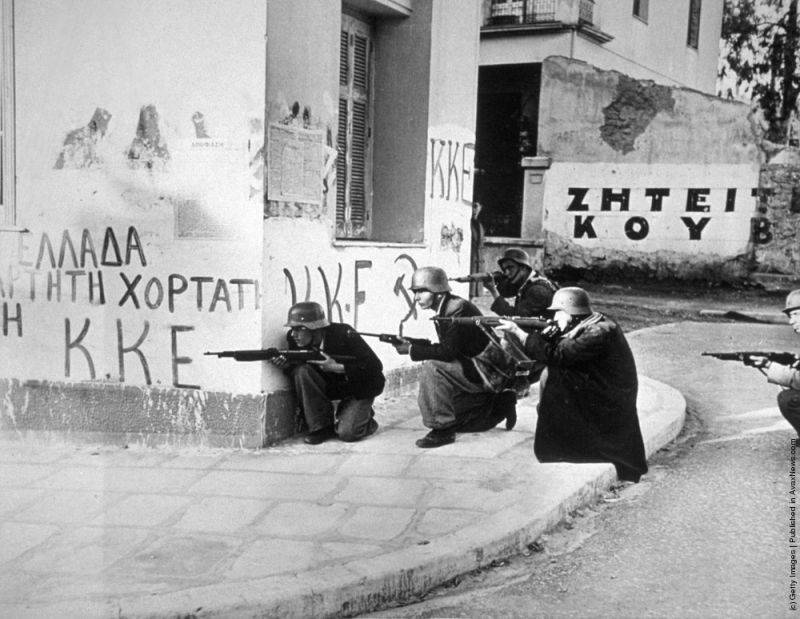
Information